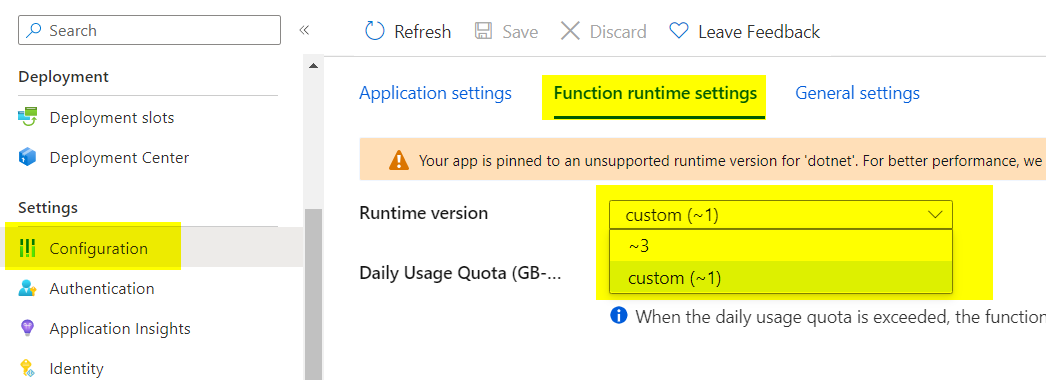Dataverse : Azure Functions .Net Framework vs .Net Core / Runtime 1 vs 4 - Migration Steps
Dataverse : Azure Functions .Net Framework vs .Net Core / Runtime 1 vs 4 - Migration Steps:
Do you have a FunctionApp in Runtime 1 targeting a .Net Framework project and want to migrate it to a newer Runtime like 4?
This is possible! But not so simple if you don't read this article! ;)
Azure Function Runtim 4 and .Net Framework?
First of all, we must clarify a gray area introduced by Microsoft. In the official Azure Function Runtime documentation, there is a table suggesting that Runtime 4 is natively compatible with the .Net Framework. It's partially true...

In fact it seems possible but through the option to run the App in isolated process.
Here is the doc.
I have been able to try to follow the steps to do so, without success at the time of writing this article. Indeed, my version of Visual Studio doesn't seem to handle this correctly...
Here's a GitHub thread speaking about it.
So how to do?
The King is Dead, Long Live the King!
For years we have all used the Dynamics NuGet package allowing us to connect to the service and use the API. Microsoft.CrmSdk.XrmTooling.CoreAssembly
Except that this great package is only available from version 4.6.2 of the .Net Framework!
Until recently, there was no solution to use these DLLs with .Net Core...Then the Microsoft.PowerPlatform.Dataverse.Client project appeared. It's been in preview for a while, but it's now been in GA since June 2022!
This package will not only allow you to retrieve your development habits but will also offer you new methods and others to come.
Here is a sample code allowing you to connect to Dataverse and do a WhoAmI. You will notice that the code is not changing a lot between the old version CrmServiceClient and the new ServiceClient!
var service = new ServiceClient($@"AuthType=ClientSecret;url=URL;ClientId=ID;ClientSecret=SECRET");
var userId = (WhoAmIResponse)service .Execute(new WhoAmIRequest());
log.LogTrace("UserId : " + userId.UserId);
Ready for Azure Runtime 4!
Thanks to this, you can now fully consider migrating your FunctionApps from runtime 1 to 4 and thus be up to date in your PaaS.
You will obviously have to consider skipping the following points:
- Change the Runtime on Azure Function.
- Modify your VS project to point to the correct framework and runtime version.
- Modify your NuGet packages to remove the old and reference the new.
- Modify the code to resolve the errors.
- And more...
Step by Step
1. Change the Runtime on Azure Function.
- Log in to your Azure Portal and navigate to your Function App.
- Go to the Configuration section and then to the Function Runtime Settings tab.
- Here you will have a drop-down list to choose the Runtime version.

- If ever you cannot select version 4. Here is a procedure allowing you to carry out the modification by CLI script.
az login
az functionapp config set --net-framework-version v6.0 -g -n
az functionapp config appsettings set --settings FUNCTIONS_EXTENSION_VERSION=~4 -g -n
2. Modify your VS project to point to the correct framework and runtime version
- Open your Visual Studio project and open the .csproj file.
- Modify these two nodes as follows.

3. Other steps
I think you know how to modify the NuGet packages and migrate your code. No trap here. :)
Enjoy !
Dataverse : Azure Functions .Net Framework vs .Net Core / Runtime 1 vs 4 - Migration Steps
Published on:
Learn moreRelated posts
Automating UI Testing for Model Driven Apps with Power Platform Test Engine (Preview)
Model-driven apps in Power Platform provide a structured way to build data-centric applications using Dataverse where the user interface is au...
Microsoft Purview: Data Lifecycle Management- Azure PST Import
Azure PST Import is a migration method that enables PST files stored in Azure Blob Storage to be imported directly into Exchange Online mailbo...
How Snowflake scales with Azure IaaS
Microsoft 365 & Power Platform Community Call – February 19th, 2026 – Screenshot Summary
Call Highlights SharePoint Quicklinks: Primary PnP Website: https://aka.ms/m365pnp Documentation & Guidance SharePoint Dev Videos Issues...
Microsoft Rewards: Retirement of Azure AD Account Linking
Microsoft is retiring the Azure AD Account Linking feature for Microsoft Rewards by March 19, 2026. Users can no longer link work accounts to ...
Power Platform – February 2026 – Screenshot Summary
Community Call Highlights Quicklinks: Power Platform Community: Power Apps Power Automate Power BI Power Virtual Agents Power Pages M365 Pla...
Microsoft 365 & Power Platform Call (Microsoft Speakers) – February 17th, 2026 – Screenshot Summary
Call Highlights SharePoint Quicklinks: Primary PnP Website: https://aka.ms/m365pnp Documentation & Guidance SharePoint Dev Videos Issues...